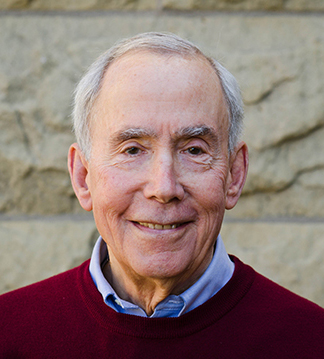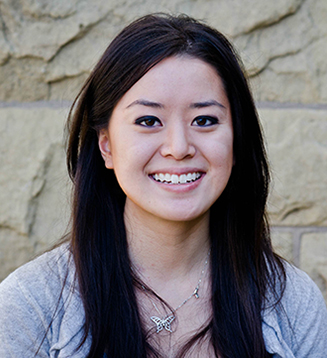

When Thomas Ehrlich sat down three years ago to write his 14th book, about the importance of public service and social entrepreneurship for young people, his first inclination was to call it What You Can Do for Your Country. At 76, the Stanford visiting professor of education still remembered the exhilaration and pride he felt while working for the Kennedy administration in the early 1960s, and he wanted to convey that spirit to a new generation.
Then a publisher with whom he had worked suggested that if Ehrlich really wanted the book to reach teens and twenty-somethings, he ought to include some younger voices. So out went the original title, and in came a spirited co-author — then 19-year-old Ernestine Fu, a Stanford engineering wunderkind who started her own nonprofit organization when she was just 15.
The result of their unusual collaboration, Civic Work, Civic Lessons (Rowman & Littlefield/University Press of America, Inc. 2013), is a persuasive inter-generational call for fresh, talented public servants in the halls of government, non-profit organizations and corporate America. Each chapter offers tips for success in the arena, gleaned from the authors’ own experience and interviews with dozens of inspiring young civic leaders from throughout the United States. The book ends with advice on changing the world through the use of social media and other new technologies.
Like many members of his generation, Ehrlich grew up thinking that service in the United States government was one of the noblest things a citizen could do. After graduating from Harvard Law School in the late 1950s, he clerked for Judge Learned Hand of the U.S. Second Court of Appeals. Then he moved over to the State Department, where he served as special assistant to its legal adviser (his first day on the job coincided with the onset of the Cuban Missile Crisis), and special assistant to George W. Ball, undersecretary of state under Presidents Kennedy and Johnson.
In 1965, Ehrlich came west to Stanford Law School and went on to play a key role, as dean, in the construction of the new Law School buildings — Crown Quadrangle. He returned to Washington to become first president of the Legal Services Corporation, which provides civil legal aid to poor people, followed by a position in charge of foreign-aid policy, reporting directly to President Carter. He moved back to academia in 1981 to serve as provost at the University of Pennsylvania and then president at Indiana University. For proof of Ehrlich’s influential career, one need only look at the photographs in his tidy office at the Stanford Graduate School of Education. On the wall are signed pictures of six U.S. presidents: Kennedy, Johnson, Ford, Carter, Clinton and George W. Bush.
Fu’s resume, while considerably shorter, is impressive in its own right. Growing up in a tough part of Los Angeles, she founded a nonprofit organization, Visual Arts and Music for Society, which made it possible for teenage musicians to perform at hospitals, senior citizens’ homes and shelters for abused women and homeless families. Later she served on the State Farm Youth Advisory Board, where she directed grants to youth-led service learning projects throughout North America. As a Stanford undergraduate, she was heavily involved with student government and served on the Trustees’ Committee on Land and Buildings, promoting sustainability while doing honors work in environmental engineering. To top it off, she made the cover of Forbes magazine in her sophomore year after accepting a high-profile part-time position at the San Francisco venture capital firm of Alsop Louie Partners — a dream job she continues to this day while working toward her Stanford doctorate in engineering. (In June she received both her undergraduate degree in energy strategy and engineering and her master’s degree in management science and engineering.)
Collaborating as co-authors on the new book, Fu and Ehrlich discovered they had much to learn from each other. She introduced him to the networking powers of Facebook, LinkedIn, Twitter and the blogosphere, while he exposed her to the value of government service in solving some of society’s biggest problems. “I do feel very strongly,” he explained, “that while there has been an explosion of wonderful civic work by incredible social entrepreneurs like Ernestine — if I could turn the world over to them, I’d just do it — at the same time I know that we have a democracy, and it’s not a spectator sport. It needs active, engaged, responsible, knowledgeable citizens involved in public policy-making.”
His co-author agreed. “Tom is correct when he says that a lot of young people today are disillusioned with politics,” Fu noted, sitting in his office on campus in the CERAS building. “Before this, I hadn’t known anyone who had been involved in public service for their entire career. One of the most inspirational parts of this project was learning about Tom’s story and realizing that you could influence and change society through public policy.”
Fittingly, the first chapter of their new book focuses on the importance of professors, teachers, parents and grandparents as public service mentors and models of integrity. Other chapters examine the motives that drive people to engage in civic work, the importance of being detail-oriented while setting clear goals, and the myriad rewards of community service, even when the going gets tough. “Some of the people we interviewed for this book were deeply frustrated; there was no question about it,” Ehrlich said frankly. “I remember one young man who worked in a health clinic in New Orleans after Hurricane Katrina. There were challenges there that just couldn’t be met. I had similar feelings of frustration myself when I worked for various administrations, particularly during the Vietnam era.”
Still, he insisted, there never has been a better time to get involved in public service. “There are so many avenues now that social media have opened up, not just for clicking, but for really helping,” he said. His next joint project with Fu: a series of posts spotlighting unsung social entrepreneurs from throughout the United States. It can be found at http://www.forbes.com/sites/ehrlichfu/.
Theresa Johnston ’83 is a freelance writer in Palo Alto. Photos are by Jason van der Merwe.
Subscribe to our monthly newsletter.